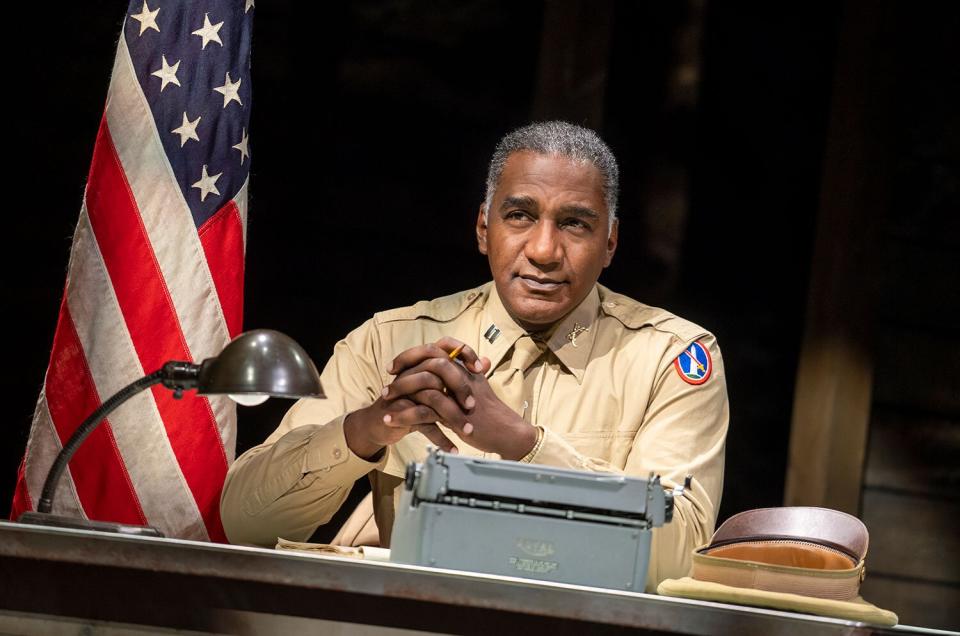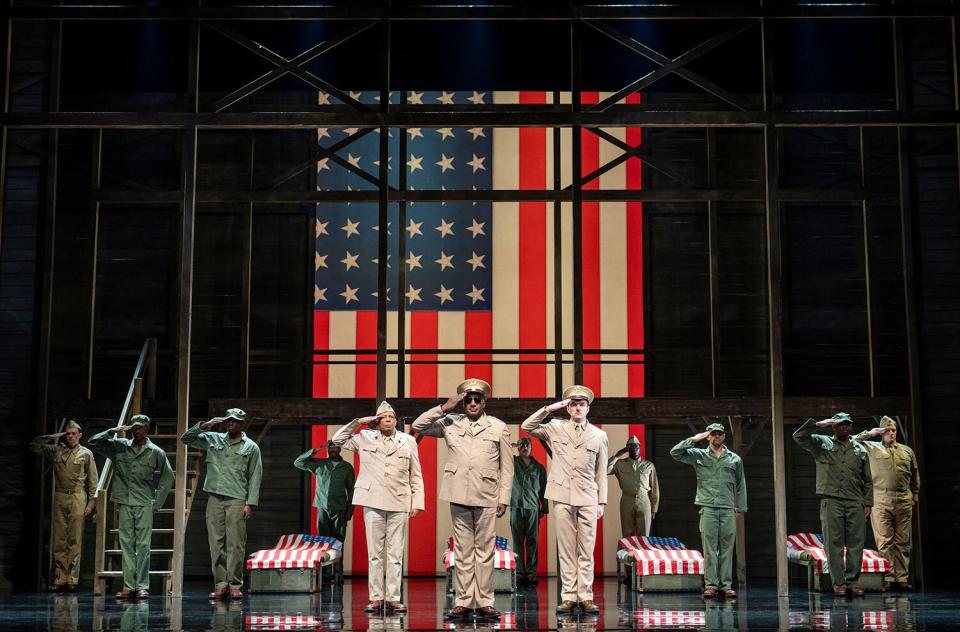A Soldier's Play review: The Pulitzer Prize winner offers a timely, yet sterile revival
- Oops!Something went wrong.Please try again later.
- Oops!Something went wrong.Please try again later.
Since its premiere Off-Broadway in 1981, A Soldier's Play has loomed large as an American classic and vital part of the canon.
Now, a revival (which won the 2020 Tony Award for Best Revival of a Play) returns to Los Angeles' Center Theatre Group, with veteran director Kenny Leon helming Charles Fuller's Pulitzer Prize-winning play, which wraps its exploration of internalized racism in the trappings of a murder mystery. But what this revival possesses in heft, it lacks in heart and emotional resonance.
When Sergeant Vernon C. Waters (Eugene Lee), the rare Black officer, is found dead in the woods outside army base Fort Neal, Captain Charles Taylor (William Connell) is determined to find the culprit. Captain Richard Davenport (Norm Lewis) is sent to investigate, tasked with determining whether the murderer was the local KKK or someone closer to Waters on the base. What he uncovers is a startling web of self-hatred, racism, and abuse of power.

Joan Marcus Norm Lewis in 'A Soldier's Play'
Lewis commands the stage as Davenport, exhibiting the prepossession and barely-concealed scorn that often defined the performances of Sidney Poitier. In Lewis' hands, Davenport isn't easily ruffled, resolute in his duty and commitment to justice. Lewis, who has become a Broadway legend many times over, brings a winking amusement to the role, a twinkle in his eye that reminds us he's the smartest person in the room.
Lee, who played Corporal Cobb in the original 1981 production, is slippery and cruel as Sergeant Waters. He perfectly tempers Waters' reveal — his by-the-book army man is unveiled as a self-hating, sadistic drill sergeant — and his demoralized intoxication conveys the hollowness of his supposed ideals. Lee plays Waters as a pinched man who has had every ounce of kindness and empathy squeezed out of him until all that's left is a bag of skin and bones.
The entire ensemble delivers thoughtful, lived-in work as the unit (and former baseball team) under Waters' command. Sheldon D. Brown is a particular standout as the sensitive Private C.J. Memphis, who would rather play his guitar than shoot a gun.
Memphis could easily become the caricature of what Waters' paints him as — a simpleton with nothing to offer the world — but Brown layers his Memphis with so much compassion, patience, and grace that he emerges as the emotional lynchpin of the play. Memphis is the vessel for the play's commentary on internalized racism and the barbarism of prison and isolation, and in Brown's hands the character casts a looming shadow over the story, even before we learn his fate. He stands as a stark reminder that the very fascism these soldiers are being trained to combat can fester on home soil. For it is a fascist notion that someone must contribute and be a "credit" to society to have a right to life and dignity.
Even if audiences aren't familiar with A Soldier's Play, they likely know it was a breakout moment for then up-and-comer Denzel Washington as Private Peterson (a role he reprised in a 1984 film adaptation). Tarik Lowe possesses a similar energy to Washington, a quiet fury always lurking near the surface, but his Peterson feels less unpredictable, ultimately undercutting some of the surprise of the play's conclusion.

Joan Marcus The company of 'A Soldier's Play'
Leon's direction is as sober and precise as an army drill. No one simply walks across the stage or stands — they march or stand at attention, even when not required to by the narrative. Derek McLane's stark wooden set emphasizes this, lending a brutalism to the storytelling that makes even the slightest pop of color (particularly in the play's final tableau) startling.
Fuller's play is as timely as ever in how it probes race, power, and the African-American experience. But this production, while marvelously realized by Leon and its talented cast, lacks a sense of urgency. There's a rote quality to it, a sense of going through the motions that eliminates some of the stakes required to make us engage on a more visceral level.
Perhaps A Soldier's Play isn't meant to be shocking in the ways it exposes the insidious ugliness of racism, its tale of soldiers dying to see battle because they hope it will finally make their white compatriots see them as human beings. The play can't shock because it's a tale as American as apple pie — but the best pies have the capacity to surprise amidst a mix of familiar flavors. Sadly, this production of A Soldier's Play is missing that crucial ingredient. B
Related content:

